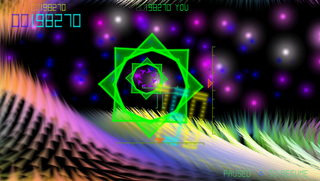Jeff Minter accuses Atari of "bullying" over blocked TxK release


"If I ever got a fraction of Notch-rich I'd buy Atari and give it to the people. So many of us started from there, it should belong to us all."
Llamasoft—which is to say, Jeff Minter—released the Tempest-like TxK early last year for the PlayStation Vita, and it went over pretty well: Well enough to justify a multiplatform release later this year, including for the PC. But Minter revealed today that those plans have been canceled because of pressure from Atari, which he claims has accused him of violating the company's copyright on Tempest 2000.
Minter detailed his troubles with Atari in a lengthy blog post, mirrored on Pastebin (his own site is currently struggling to keep up with the attention), in which he said the matter has actually been going on for some time now. He'd kept it quiet in hopes of reaching a deal with Atari, perhaps for an officially licensed version of the game, but the company "never gave an inch and just continued with threats and bullying," he wrote.
Atari accused Minter of accessing, and stealing secrets from, the Tempest 2000 source code in order to create TxK; also that the TxK soundtrack "sounds identical" to that of Tempest 2000, that the game features an AI droid, and that Minter is attempting to cash in on the Tempest name and "Atari's stellar reputation." The irony, of course, is that Minter is actually the creator of Tempest 2000, a game based on the famous 1981 arcade standup Tempest that was originally released as an Atari Jaguar exclusive in 1994. Furthermore, he said the TxK soundtrack is entirely original, and AI droids have appeared in almost every game he's made since Llamatron, which came out three years prior to Tempest 2000.
Unfortunately, despite that history and Minter's own avowed desire to avoid any connection with the current iteration of Atari—"The last thing I really wanted was for Llamasoft to be associated with the undead Atari responsible for turning Star Raiders into a fucking slot machine," he wrote—he's been forced to yield to its demands. "[The claims are] all abject bollocks, but set up legally so as to be expensive for anyone to contest," he explained. "Even just going back and forth a few times with letters responding to their threats ended up running up a couple of grand in legal bills, and there is simply no way on God's earth I can afford any kind of a legal battle."
In response to the complaint, Atari issued a statement claiming that it actually went to Minter with its concerns immediately following the launch of TxK last year, and has been in contact with him ever since. IT also emphasized that it has not actually brought legal action against Minter.
"Atari values and protects its intellectual property and expects others to respect its copyrights and trademarks. When Llamasoft launched TxK in early 2014, Atari was surprised and dismayed by the very close similarities between TxK and the Tempest franchise," it said. "Atari was not alone in noticing the incredible likeness between the titles. Several major gaming outlets also remarked at the similarity of features and overall appearance of TxK to Tempest; one stated of TxK, 'This is essentially Tempest.' There is no lawsuit. Atari has been in continuous contact with the developer since the game launched in hopes that the matter would be resolved."
As Minter implied, the Atari of today is a far cry from the company it used to be. Its history is convoluted, to put it gently, and last year it announced a new strategy of focusing on "LGBT, social casinos, real-money gambling, and YouTube with exclusive content." More recently, it revealed plans for reboots of Alone in the Dark and Haunted House, an open-world Asteroids game, and Rollercoaster Tycoon World, the recent trailer for which, I think it's fair to say, utterly failed to captivate fans of the franchise.
PC Gamer Newsletter
Sign up to get the best content of the week, and great gaming deals, as picked by the editors.
Atari's claim not only slams the door on the planned PC port, it could also force the PS Vita version offline as well: Minter said Atari is pushing him to remove it from the PlayStation Store and sign papers agreeing to never again make another "Tempest style" game. He didn't indicate whether he intends to agree to those demands, although it's safe to bet that he won't; for now, he's busy posting bits and pieces of Atari's specific allegations—"Tempest 2000 was 'merely an update to Tempest to which I made no contribution' apparently"—on Twitter.
UPDATE: Minter has effectively confirmed Atari's statement that it has been in contact with him regarding TxK since shortly after it launched by posting a June 2014 letter from a lawyer representing the company. It asserts Atari's ownership of Tempest, and describes TxK as a "blatant copy."
"Contrary to your assertion, there is nothing remotely 'original' in TxK and in no meaningful sense can TxK be described as your clients' 'own independent creation. TxK is quite plainly a remake or updated version of the Tempest games," it says. "Indeed, your client made every effort to keep TxK very closely to the visual design, look and feel and identity of the original Tempest game. TxK has been acknowledged by numerous commentators as a sequel to the Tempest games."
Minter, however, denied that the exchange of letters between lawyers counted as contact between Atari and Llamasoft. "Their only contact has been threatening letters from lawyers. This is not a dialogue," he tweeted. "I don't count an endless stream of lawyer-crafted attempts to steal my lunch money as 'contact with the developer.' Speak to me face to face. FWIW we tried to approach 'Atari' in a non-lawyerly fashion via a real ex-Atarian who knew someone inside there and were roundly rebuffed."
Andy has been gaming on PCs from the very beginning, starting as a youngster with text adventures and primitive action games on a cassette-based TRS80. From there he graduated to the glory days of Sierra Online adventures and Microprose sims, ran a local BBS, learned how to build PCs, and developed a longstanding love of RPGs, immersive sims, and shooters. He began writing videogame news in 2007 for The Escapist and somehow managed to avoid getting fired until 2014, when he joined the storied ranks of PC Gamer. He covers all aspects of the industry, from new game announcements and patch notes to legal disputes, Twitch beefs, esports, and Henry Cavill. Lots of Henry Cavill.
Most Popular





